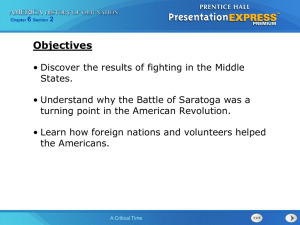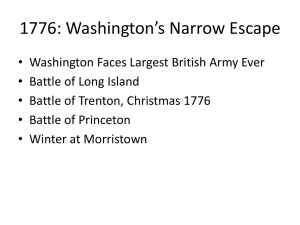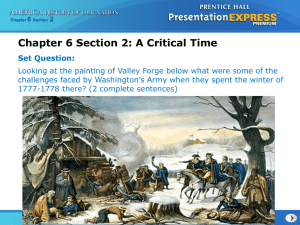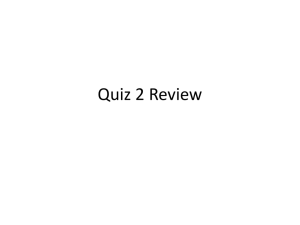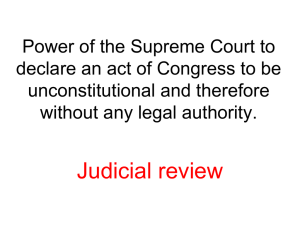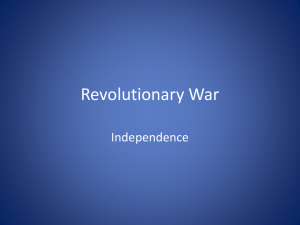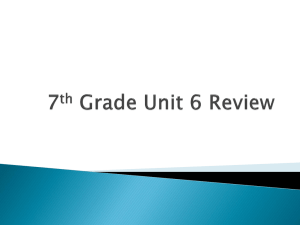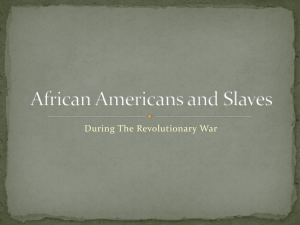The American Nation Chapter 6 Review
advertisement
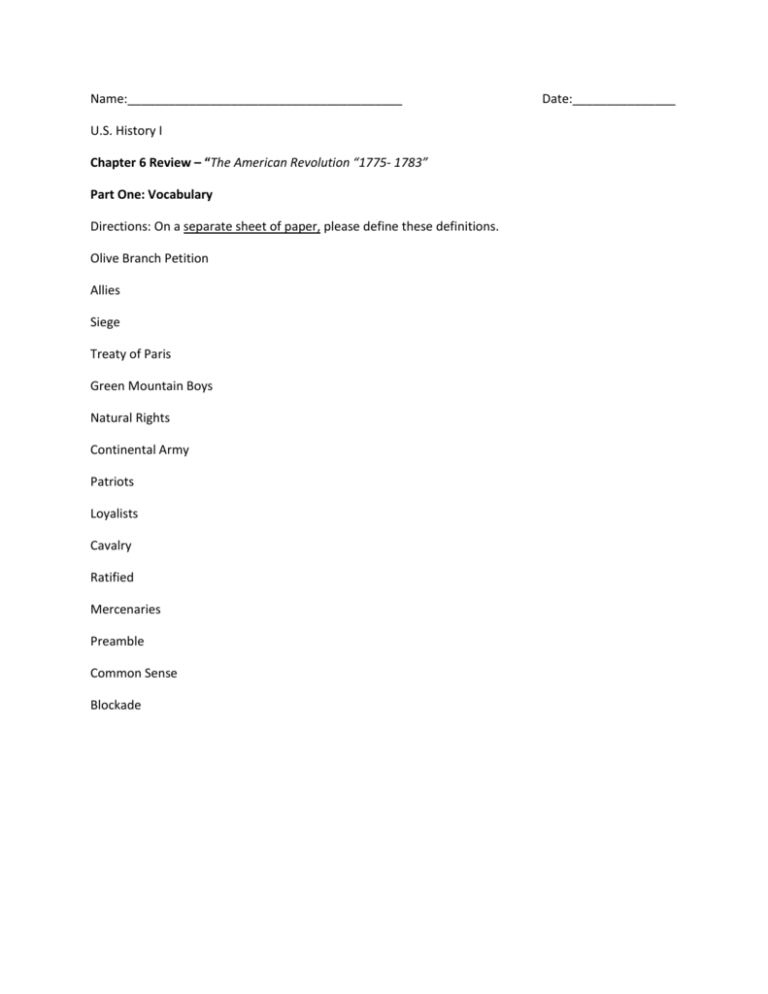
Name:________________________________________ U.S. History I Chapter 6 Review – “The American Revolution “1775- 1783” Part One: Vocabulary Directions: On a separate sheet of paper, please define these definitions. Olive Branch Petition Allies Siege Treaty of Paris Green Mountain Boys Natural Rights Continental Army Patriots Loyalists Cavalry Ratified Mercenaries Preamble Common Sense Blockade Date:_______________ Part Two: Important Battles Directions: For part two, please describe in FULL DETAIL the importance of each battle, who the key figures of the battle were, what the outcome of the battle was, and what was the significance of the battle? The Battle of Bunker Hill Battle of Saratoga Battle of Long Island Battle of Trenton Battle of Cowpens Battle of Yorktown Battle of Lexington and Concord Part Three: Important People Thomas Paine John Burgoyne Charles Cornwallis Louis XVI George Rogers Clark Nathaniel Greene Daniel Morgan Francis Marion Mary Ludwig Hayes Friedrich von Steuben Marquis de Lafayette Part Four: Comprehension Directions: For this section please answer each question Full Detail! 1. General George Washington and the Continental Army suffered several setbacks in the beginning of the Revolutionary War. List several ways that the United States were able to turn things around and defeat the British. 2. On July 4, 1776 the most important document in American History, which was written by Thomas Jefferson, was signed by 56 delegates, from the 13 colonies. This document, which has been the foundation of our government, consists of four parts. In full detail name and describe part and its importance. 3. During the American Revolution, the British had the strongest military and navy in the world. They were well trained and organized, unlike the United States military. In order to defeat the British the United States had to come up with new fighting tactics. Please describe in detail new methods the U.S used in fighting the war. 4. Describe in detail, the role that African Americans played in the Revolutionary War. Why were they willing to risk their own lives for the freedom of others? 5. Name at least four events in full detail that led to the Revolutionary war? Name:________________________________________ Date:_______________ U.S. History I Chapter 6 Review – “The American Revolution “1775- 1783” Part One: Vocabulary Directions: On a separate sheet of paper, please define these definitions. Olive Branch Petition - It was a peace petition sent to King George by Colonial delegates AFTER the battles of Lexington and Concord. Allies – Work together for a common goal. Siege – when an army surrounds and blockades an enemy position in an attempt to capture it. Treaty of Paris - Ratified in 1783, it recognized the United States as an independent Nation Green Mountain Boys – Vermont colonial militia led by Ethan Allen that made a surprise attack on Fort Ticonderoga. Natural Rights - Rights that belong to all people from birth. Continental Army - an army that was established by the Second Continental Congress to fight the British. Patriots - Colonists who favored war against Britain. Loyalists - Colonists who remained loyal to Britain Cavalry - troops on horseback Ratified – to approve or change Mercenaries – soldiers who fight merely for pay, often for a foreign country. Preamble - Introduction to the Declaration of Independence, constitution, or other official documents. Common Sense – a 1776 essay by Thomas Paine that urged the colonies to declare independence. Blockade – the shutting of a port to keep people or supplies from moving in or out. Part Two: Important Battles Directions: For part two, please describe in FULL DETAIL the importance of each battle, who the key figures of the battle were, what the outcome of the battle was, and what was the significance of the battle? The Battle of Bunker Hill The First major battle of the Revolution It proved that Americans could fight bravely. Showed that Britain would not be easily defeated Battle of Saratoga. Major turning point in the war It ended the British threat to New England. Boosted American Morale Most importantly it convinced France to become an ally of the United States. Battle of Long Island General Howe defeated the Americans. 1,400 Americans were killed, wounded, or captured. Nathanael Hale a scout, volunteered to go behind enemy lines. “ I only regret that I have but one life to lose for my country.” Battle of Trenton On December 25, Washington led his troops on a surprise attack across the Delaware River. December 26 , the Americans surprised Hessian troops guarding Trenton and took most of them Prisoner. Washington fooled Cornwallis by leaving the fires burning and slipped behind the British lines to attack a British Force that was marching toward Princeton. Battle of Cowpens In January, 1781 General Morgan won the battle of Cowpens. He divided his troops into a front line and a rear line. He ordered the front line to retreat after firing just two shots. The British, thinking the American we retreating, charged forward- straight into the Fire of Morgan’s second rank. Battle of Yorktown More than 16,000 American and French troops laid siege to Cornwallis’s army of less than 8,000. Day after day American and French artillery pounded the British On October 19, 1781, the British surrendered their weapons. Part Three: Important People Thomas Paine - Author Common Sense John Burgoyne – British General, he believed that if he cut off New England from the Rest of the colonies the war would be over. He was able to recapture Fort Ticonderoga. The Green Mountain boys hurried into New York to face Burgoyne. The American forces surrounded Burgoyne and his men and as a result was forced to surrender his entire army to the Americans on October 17, 177. Battle of Saratoga. Charles Cornwallis – General of the British Army who surrendered at Yorktown. Louis XVI- French King George Rogers Clark - With the help of the Miami Indians, Clark captured the British forts at Kaskaskia and Cahokia. He later planned a surprise attack on the British fort at Vincennes. Nathaniel Greene - American General, his capabilities as a military leader was second only to Washington’s. He used his knowledge of local geography to engage the British and put them at a disadvantage. Daniel Morgan - American General, Won the victory at Cowpens Francis Marion - Known as the “Swamp Fox”, He used Guerrilla war fare against the British. Mary Ludwig Hayes - At the Battle of Monmouth, she carried water to her husband and other soldiers. When her husband was injured she took his places loading and firing a cannon. Friedrich von Steuben - young French noble, trained Washington’s troops to march and drill. He served in the Prussian Army which was the best in Europe. Marquis de Lafayette - brought trained soldiers to help the patriots’ cause. He became on of Washington’s most trusted friends. Part Four: Comprehension Directions: For this section please answer each question Full Detail! 1. General George Washington and the Continental Army suffered several setbacks in the beginning of the Revolutionary War. List several ways that the United States were able to turn things around and defeat the British. Their knowledge of the land to defeat the British. Use of Guerrilla warfare. Aid from other countries such as France and Poland Victory at Saratoga proved toe France that the Americans could defeat the British and it convinced King Louis of France to send aid to the Americans. 2. On July 4, 1776 the most important document in American History, which was written by Thomas Jefferson, was signed by 56 delegates, from the 13 colonies. This document, which has been the foundation of our government, consists of four parts. In full detail name and describe part and its importance. Pre amble, introduction to the declaration of Independence. 1. Stressed the Idea of Natural Rights, or rights belonging to all people from birth. 2. Lists the wrongs that led the American sot Break away from Britain. 3. Stated that he colonies are now the United States of Americas and that all ties with Britain have been cut. 3. During the American Revolution, the British had the strongest military and navy in the world. They were well trained and organized, unlike the United States military. In order to defeat the British the United States had to come up with new fighting tactics. Please describe in detail new methods the U.S used in fighting the war. Militia Guerrilla Warfare Cavalry trained by Casimir Pulaski 4. Describe in detail, the role that African Americans played in the Revolutionary War. Why were they willing to risk their own lives for the freedom of others? Britain offered freedom to some male slaves who would serve the king AS a result, Washington asked Congress to allow free African Americans to enlist. 5,000 African Americans from all colonies, except South Carolina served in the army. 2,000 served in the navy, which allowed African Americans to join. Some formed special regiments Some served as spies Whites recognized the courage of their African American comrades. 6. Name at least four events in full detail that led to the Revolutionary war? Boston Tea Party Boston Massacre Intolerable Acts Stamp and Sugar Acts
